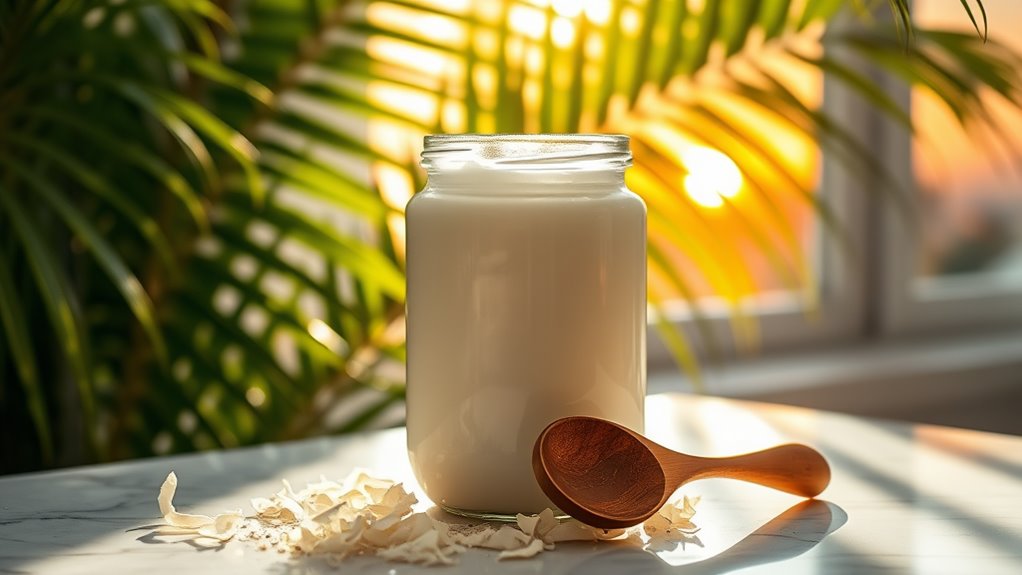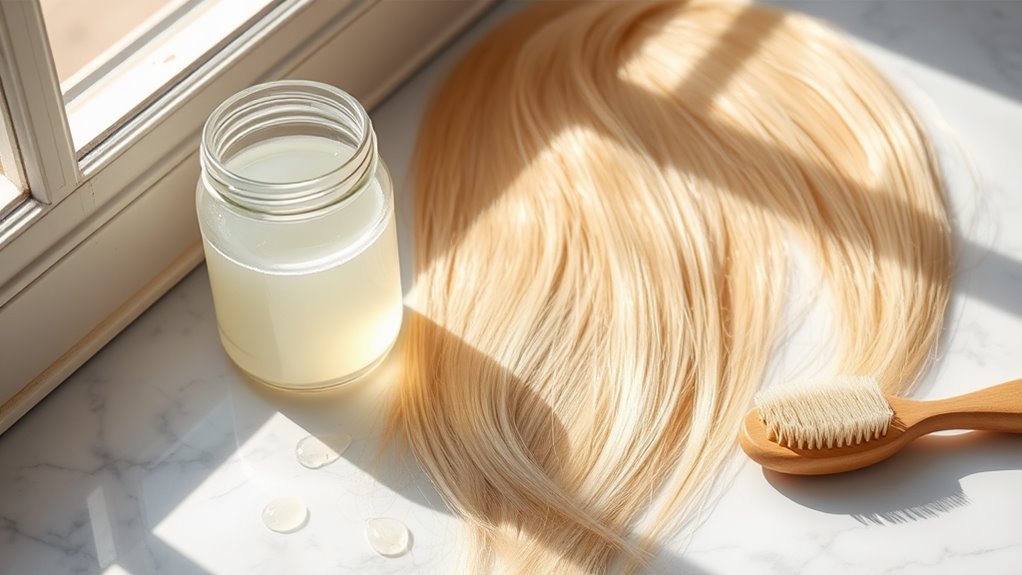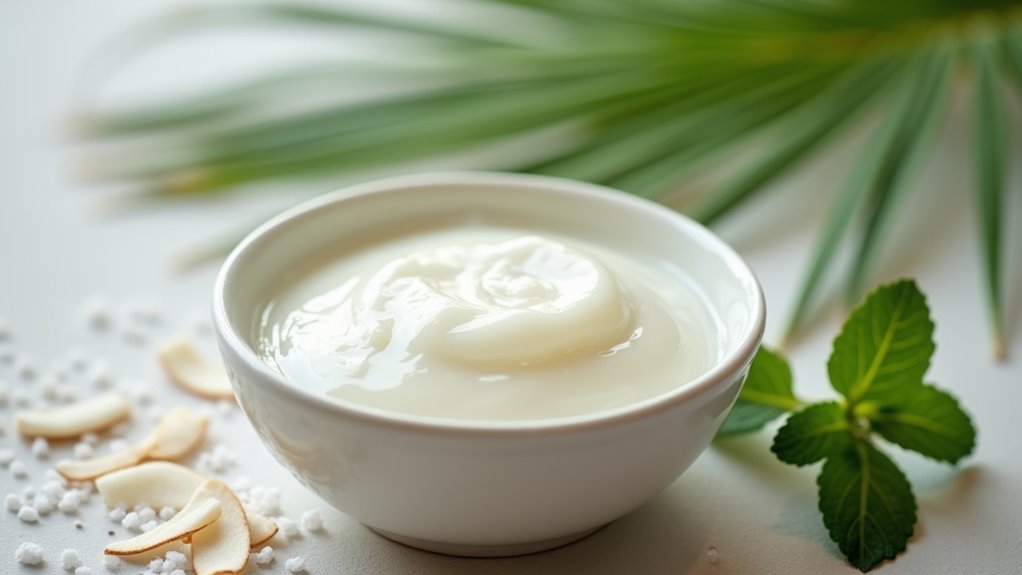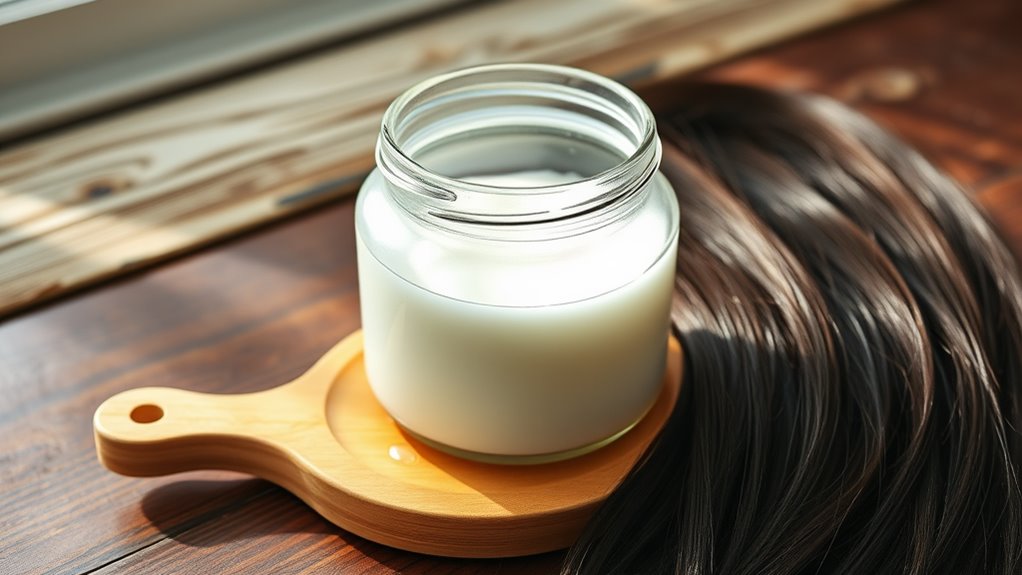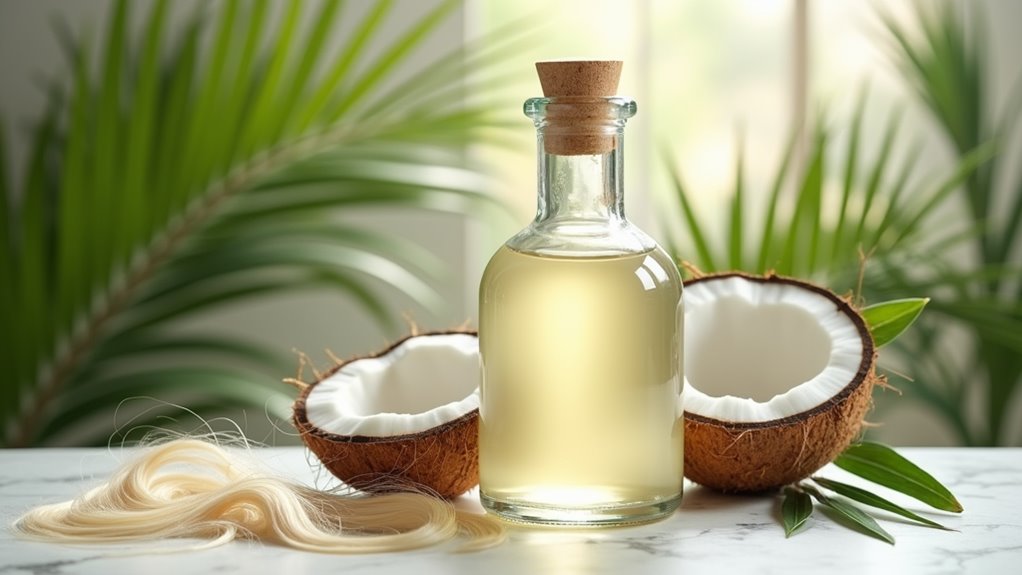This Coconut Oil Hair Mask Is a Game Changer
This coconut oil hair mask is a game changer for your hair care routine! It deeply moisturizes, prevents protein loss, and enhances your hair’s strength and shine. Packed with nourishing ingredients like honey and eggs, it supports scalp health and reduces dryness. Plus, it’s customizable for your specific hair type, whether you have fine or thick strands. If you’re curious about how to apply it effectively and maximize its benefits, there’s so much more to uncover!
The Benefits of Coconut Oil for Hair
Coconut oil is a powerhouse for your hair, offering a multitude of benefits that can transform its health and appearance.
When you apply a coconut oil hair mask, you’re not just conditioning your locks; you’re also preventing protein loss that leads to breakage. Its unique molecular structure allows for deep penetration into the hair shaft, making it perfect for all hair types, including those damaged by bleach or chemicals.
Plus, coconut oil enhances scalp health by combating dandruff and supporting scalp microbiome moisturizing effectively. This natural ingredient supports hair growth by strengthening follicles and reducing fall, making it an essential addition to your hair care routine.
Key Ingredients in a Coconut Oil Hair Mask
A coconut oil hair mask can work wonders for your locks, but its standout effects stem from the key ingredients it comprises.
Coconut oil serves as the primary moisturizer, while honey adds antibacterial properties for healthier hair. Eggs boost strength with protein, and olive oil offers additional hydration. Coconut oil is especially known for its ability to reduce protein loss in hair, making it an essential component in maintaining hair health. Additionally, its molecular structure allows coconut oil to penetrate deep into the hair shaft, enhancing overall moisture retention.
For an extra nutrient kick, avocado provides vitamins A, D, and E. Lavender essential oil soothes the scalp, and sweet almond oil enhances shine.
Incorporating nourishing elements like kaolin clay helps cleanse, while glycerin retains moisture, ensuring your hair feels soft, vibrant, and revitalized after every use.
How to Apply a Coconut Oil Hair Mask
Getting your hair ready for a coconut oil mask is essential for maximum benefits. You’ll want to start by brushing through your hair to prevent tangles, then dampen it slightly before applying the mask. This preparation sets the stage for even application and optimal absorption, ensuring your strands get all the nourishment they need. Remember, applying the mask on dirty, dry hair will yield the best results. Applying it to a healthy scalp will also enhance the effectiveness of the mask.
Preparing Your Hair
Before diving into the application of your coconut oil hair mask, it’s essential to prep your hair to maximize absorption and benefits.
Start by lightly misting damp hair, making it more receptive to the oil. Coconut oil has been shown to reduce protein loss, enhancing the overall health of your hair after application.
Gently detangle your strands using a comb to ensure even distribution, avoiding soaking wet hair that can block penetration.
Section your hair into manageable parts, securing them with clips, focusing on dry or damaged areas.
Warm the coconut oil slightly for better spreadability, and consider massaging your scalp to enhance circulation.
With these steps, you’re set for an effective and rejuvenating mask experience!
Application Techniques
With your hair prepped and ready, applying the coconut oil hair mask effectively becomes the next focus.
Start by warming the coconut oil in your palms—just ensure it’s pleasantly warm, not hot.
Spray your hair lightly to dampen it, helping the oil distribute evenly.
Section your hair for manageable application, using a comb to ensure every strand is coated.
For drier ends, apply more oil, but use less near the scalp.
Consider mixing in ingredients like honey or essential oils for added nourishment.
Don’t forget to gently massage your scalp; it enhances absorption and relaxation throughout the process.
Rinsing and Follow-Up
Once you’ve allowed the coconut oil mask to work its magic for 15 to 20 minutes, rinsing it out properly is essential for achieving optimal results.
Start by using lukewarm water to ensure all the oil is removed. For particularly oily hair, apply shampoo before wetting, helping to lift excess oil. Rinse thoroughly and follow up with your regular shampoo and conditioner, restoring moisture and balance. If needed, an egg rinse can clarify any remaining residue, as eggs act as clarifying agents. Finally, style your hair as usual, enjoying the shine and hydration the mask provides.
Regular use will enhance hair health over time!
Customizing Your Hair Mask for Different Hair Types
When it comes to customizing your coconut oil hair mask, matching ingredients to your hair type can make all the difference.
If you’ve got curls, incorporating nourishing treatments like shea butter or yogurt will enhance moisture and definition.
For damaged strands, focus on strengthening treatments with protein-rich additions to repair and revitalize your locks. Additionally, using a mask with high concentration of lauric acid can further help moisturize and fight fungal infections, promoting healthier hair.
Tailored Ingredients for Curls
Creating a personalized coconut oil hair mask tailored for your curly locks can transform your hair care routine.
The fatty acids in coconut oil enhance moisture and manage frizz, making your curls soft and defined.
Consider adding honey for extra hydration or yogurt for additional conditioning.
Mixing with olive or avocado oil boosts hydration, while a bit of egg provides essential protein.
Applying on damp hair ensures effective absorption, and sectioning your curls helps achieve even coverage.
Cover with a shower cap to lock in moisture and enjoy the transformation of your curls into manageable, shiny, and beautiful spirals.
Nourishing Treatments for Damage
Tailoring a coconut oil hair mask doesn’t just stop at enhancing your curls; it’s also about nurturing and repairing damage across various hair types.
For fine hair, blend in lightweight jojoba oil to keep your strands buoyant.
If your hair’s thick, mix rich coconut oil and shea butter for deep hydration.
Wavy locks thrive with balanced moisture and curl-defining ingredients.
Coily hair requires intense hydration along with strengthening agents.
Regularly applying these customized masks not only revives your hair’s health but also restores its natural vibrance.
Potential Risks and Considerations
Although coconut oil is often celebrated for its moisturizing and nourishing properties, there are potential risks and considerations that you should keep in mind. Excessive use can clog hair follicles, hindering growth, and lead to protein loss, weakening your hair. If not washed out properly, it may leave a greasy residue, and for some, it can even irritate the skin. Curly, coarse, or brittle hair types may not react well. To maximize benefits and minimize risks, control the amount you use, wash thoroughly, and monitor your hair’s health closely after application. Additionally, frizz occurs when the cuticle layer of hair is lifted, which can be exacerbated by improper usage of products like coconut oil. Balance is key for healthy, vibrant locks!
Enhancing Scalp Health With Coconut Oil
How can coconut oil transform your scalp health?
This incredible oil hydrates, nourishes, and protects your scalp, making it essential for hair vitality.
Here’s how:
- Deep Moisturization: It penetrates the scalp, reducing dryness, flaking, and irritation while supporting healthy follicles.
- Antifungal Protection: Its antibacterial and antifungal properties combat dandruff-causing bacteria and soothe inflammation.
- Hair Growth Support: Coconut oil nourishes hair follicles and enhances circulation, promoting strong, healthy growth. Its medium-chain fatty acids provide effective nourishment for the scalp.
Embrace coconut oil as your go-to treatment for a revitalized scalp and stronger, silkier hair.
You won’t regret it!

